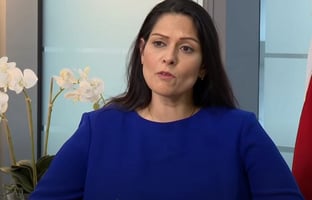It’s an interview that has been labelled as a ‘humiliation’.
It’s been a little over a week since we gave you our analysis of a high-profile media interview disaster.
And yet there has already been another one with almost identical failings.
The interview even featured the same exasperated journalist.
This time, it was Jonathan Reynolds facing Nick Ferrari.
He appeared on LBC to discuss a government review of parental leave and pay that aims to give “families the best possible start”.
The business and trade secretary described the initiative as a “really important piece of work”.
And the government has called it a “landmark review”.
But it quickly became clear that despite those descriptions, the politician did not have a solid grasp of the details.
Asked how much someone receives if they are on statutory paternity pay, Mr Reynolds said: “My youngest is 10, so I’m not actually sure what the statutory is any more. But it is usually about the time, in particular, that people are looking at – the duration of paternity leave. But it is not generous compared to other places.”
The missing detail was something Mr Ferrari returned to a few minutes later.
Here is the key exchange:
Ferrari: “Do you not feel you should know what the statutory paternity leave is in this country, if this is a very important piece of work, as you said right at the top? Mr Reynolds, shouldn’t you know what it is?
Reynolds: “I should, to be honest, Nick, but I must apologise to you.”
Ferrari: “Don’t worry about me. Apologise to the listeners.”
Reynolds: “It is quite a while since my youngest was born.”
Ferrari: “But you are launching this initiative today and are talking about how you want to look at the possibility of extended parental leave, and you don’t have a clue as to what we are currently paying.
Reynolds: “Really, in the main, what people are focused on, Nick, is the amount of time people get.
Ferrari: “It is £187.18p a week.”
Reynolds: “You know when I come on your show, I never try to con you if you catch me out.”
'But you're launching this initiative today...and you don't have a clue as to how much we're currently paying?'
— LBC (@LBC) July 1, 2025
'I apologise...'
Labour is reviewing parental leave, but Jonathan Reynolds is unable to tell @NickFerrariLBC how much statutory paternity pay is. pic.twitter.com/CN9pNgfPTU
It feels sloppy, doesn’t it?
We know politicians can be asked about a wide range of topics in these interviews. And you can sometimes excuse them for being caught out.
But these questions were about a review he was launching.
So, the lack of detail is a big gaffe.
Here’s what some of the other media made of it:
This interview came just a fortnight after another government minister endured a torrid time at the hands of Mr Ferrari.
During a memorable interview, Emma Reynolds was unable to give details of the location of the new Lower Thames Crossing - a major infrastructure project linking Tilbury in Essex and Gravesend in Kent handed £590 million from a £1 billion transport funding package she was on the radio to announce.
At one point, an increasingly irritated Mr Ferrari said: “I don’t mean to be rude to you personally. Is there much point continuing this conversation?
“Because you don’t know where a bridge starts. You don’t know where it ends. And you don’t know how much it costs.”
Painful stuff. And having two damaging interviews so close together is not good for the government’s reputation.
We explored the media training lessons that could be learnt from that in this blog.
But the key question today is, with that still fresh in the memory, why was Mr Reynolds not better prepared?
He and his advisers must have been aware of that interview and the fallout. Everyone seems to have seen it.
So, it is baffling that this interview began to flounder so quickly because of an inability to answer similar questions that called for basic detail.
One of the things we stress during our media skills training courses about preparation is the value of reviewing previous interviews and looking at what you could do differently.
If one of your colleagues has just suffered an embarrassing interview with the same journalist you are about to talk to, surely you would see what you can learn from that performance.
And use those findings to shape your preparation and practice.
If I had been helping him to prepare, I would have asked questions that drill into the detail of the current situation the government wants to change – the sorts of questions Mr Ferrari has a long-standing reputation for asking.
With our AI training companion – Thirty Seven – he could have tested himself answering these questions from our hard-hitting journalists.
In our free eBook on media interview preparation, we highlight the importance of spokespeople having a good understanding of who they are talking to.
In it, we say: “It is important for spokespeople to have an understanding of the person who is going to be asking the questions.
“Do they specialise in your sector? What do they normally cover? How much experience do they have?
“Different journalists have different styles and approaches. An interview on the Today programme is likely to differ from the type of interview you may get from big personality journalists on stations like LBC and Talk Radio. And this can have an impact on the way they shape the story.
“It’s also worth checking the reporter’s social media profile to see what they have been discussing.
“Similarly, a brief overview of the media outlet they work for (and most importantly, their audience) would also be helpful.”
It would seem government spokespeople and their advisors have not downloaded that eBook.
Can you afford to take the same risk?
Media First are media and communications training specialists with nearly 40 years of experience. We have a team of trainers, each with decades of experience working as journalists, presenters, communications coaches and media trainers.
Click here to find out more about our media training.
Subscribe here to be among the first to receive our blogs.






